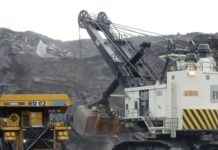
SIBANYE-Stillwater will next month complete a study that will decide the future of its Sandouville nickel refinery open amid a drastic decline in the metal’s price.
The nickel price has fallen about 40% in the last 12 months which has hurt the viability of producers, mainly in Australia, according to a recent Bloomberg News report. Wyloo Metals, owned by billionaire Andrew Forrest said it was shutting mines and BHP is partly closing a processing plant. Earlier this month, First Quantum Minerals suspended a mine.
“In the next week or so we’ll know,” said Sibanye-Stillwater spokesperson James Wellsted of Sandouville. Its short-term survival turns on a study to test whether it can viably produce pCam, a “percursor metal” to nickel sulphate.
Sibanye-Stillwater bought Sandouville for €85m in 2022 for its long-term strategic advantages that include its location in France’s Le Havre port which provides access to the European battery metals market. There is also potential to recycle platinum group metals at the facility.
But in November, Sibanye-Stillwater described Sandouville as “unsustainable” at a then LME quoted nickel price of $17,257/t. The price has since weakened to $16,306/t (three month delivery) as of January 23 which compares to over $30,000/t a year ago.
Wellsted said that in addition to the poor nickel price, costs at Sandouville were greater than anticipated. The facility was heavily under-capitalised which required expensive contractor costs given the shortage of labour in France.
The nickel price decline has been mainly driven by a flood of cheap supply from Indonesia that’s threatening to disrupt the industry, said Bloomberg News.
Sibanye-Stillwater is facing a challenges on a number of fronts. Declines in the basket price for PGMs has resulted in cost cutting at its US palladium dominant mine while the group is also waiting on the outcome of a restructuring exercise at its South African mines.
In December it closed a mined out gold shaft and rationalised operations at others cutting 575 jobs. The firm surprised the market with a $500m bond aimed at financing its expansion projects including a lithium mine in Finland.
“We have a policy that we don’t run loss-making businesses,” Sibanye-Stillwater CEO Neal Froneman said in December. “To protect the broader group and to be sustainable, we will probably have to go through further shaft closures if the prices deteriorate from the current levels,” he said.
“I suppose the socioeconomic impact of retrenchments is very hard and heavy, and it’s last thing we want to do.”










